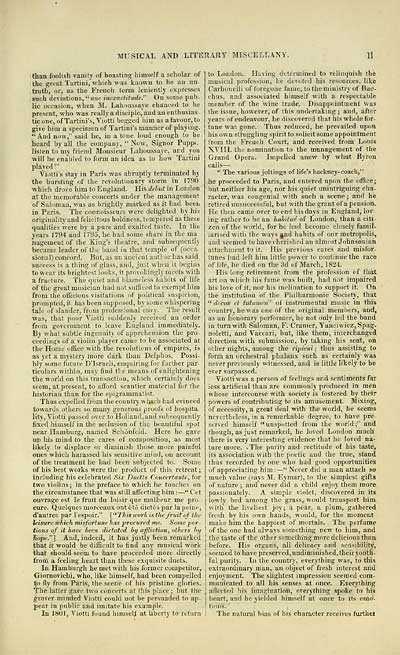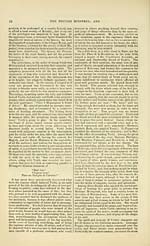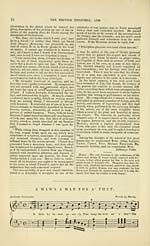Glen Collection of printed music > Printed music > British minstrel, and musical and literary miscellany
(349) Page 11
Download files
Complete book:
Individual page:
Thumbnail gallery: Grid view | List view

MUSICAL AND LITEKARV MlSCELTiANY.
11
than foolish vanity of boasting himself a scholar of
the great Tartini," which vas known to be an un-
truth, or, as the French term leniently expresses
such deviations, "Mne inexactitude." On some pub-
lic occasion, when M. Lahoussaye chanced to be
present, who was really a disciple, and an enthusias-
tic one, of Tartini's, Viotti begfjed him as a favour, to
give him a specimen of Tartini's manner of playing.
" And now," said he, in a tone loud enough to be
heard by all the company, " Now, Signer Pupp(.
listen to my friend Monsieur Lahoussaye, and you
will be enabled to form an idea as to how Tartini
plaved !'■
Viiitti's stay in Paris was abruptly terminated bj
the bursting of the revolutionary storm in 1790
which drove him to England. His deliHt in London
at the memorable concerts under the management
of Saliiman, was as brightly marked as it had beeti
in Paris. The connoisseurs were delighted by his
originality and felicitous boldness, tempered as these
qualities were by a pure and exalted taste. In the
years 1794 and 1795, he had some share in the ma
nagement of the King's theatre, and subsequent!}
became leader ol' the band in that temple of (occa-
sional) concord. But, as an ancient author has said,
success is a thing of glass, and, just when it begins
to wear its brightest looks, it provokingly meets with
a fracture. The quiet and blameless habits of life
of the great musician had not sufficed to exempt hinj
from the ofiicious visitations of political suspicion,
prompted, it has been supposed, by some whispering
tale of slander, from professional envy. The result
was, that poor Viotti suddenly received an order
from government to leave England immediately.
By what subtle ingenuity of apprehension the pro-
ceedings of a violin-player came to be associated at
the Home office with the revolutions of empires, is
as yet a mystery more dark than Delphos. Possi-
bly some future DTsraeli, enquiring for further par-
ticulars within, may find the means of enlightening
the world on this transaction, which certainly does
seem, at present, to afford scantier material for the
historian than for the epigrammatist.
Thus ex|)elled from the country which had evinced
towards others so many generous proofs of hospita-
lity, Viotti passed over to Holland, and subsequently
fixed himself in the seclusion of the beautiful spot
near Hamburg, named Sehonfeld. Here he gave
up his mind to the cares of composition, as most
likely to displace or diminish those more painful
ones which harassed his sensitive mind, on account
of the treatment he had been subjected to. Some
of his best works were the product of this retreat;
including his celebrated Six Duetts Concertante, for
two violins ; in the preface to which he touches on
the circumstance that was still afl'ecting him : — " Cet
ouvrage est le fruit du loisir que malheur me pro-
cure. Quelques morceaux out fete dictfis par la peine,
d'autres par I'espoir." [" This work is the fruit vf the
leisure n'hich misfortune has procured me. So^ne por-
tions of it have been dictated by ajfiiction, others by
hope."'] And, indeed, it has justly been remarked
that it would be diiEcult to find any musical work
that should seem to have proceeded more directly
from a feeling heart than these exquisite duets.
In Hamburgh he met with his former competitor,
Giornovichi, who, like himself, had been compelled
to fly from Paris, the scene of his pristine glories.
The latter gave two concerts at this place ; but the
graver-minded Viotti could not be persuaded to ap-
pear in public and imitate his example.
In 1801, Viotti found himself' at liberty to return
to London. Having determined to relinquish the
musical profession, he devoted his resources, like
Carboiielli of foregone fame, to the ministry of Bac-
chus, and associated himself with a respectable
member of the nine trade. Disappointment was
the issue, however, of this undertaking; and, after
years of endeavour, he discovered that his whole for-
tune was gone. Thus reduced, he prevailed upon
his own struggling spirit to solicit some appointment
from the French Court, and received from Louis
XVIII. the nomination to the management of the
Grand Opera. Impelled anew by what Byron
calls —
" The various joltings of life's hackney-coach,"
he proceeded to Paris, and entered upon the office;
but neither his age, nor his quiet unintriguing cha-
racter, was congenial with such a scene; and be
retired unsuccessful, but with the grant of a pension.
He then came over to end his days in England, lov-
ing rather to be an habitue of London, than a citi-
zen of the world, for he had become closely famil-
iarised with the ways jnd habits of our metropolis,
and seemed to have cherished an almost Johnsonian
attachment to it. His previous cares and misfor-
tunes had left him little power to continue the race
of life, he died on the 3d of March, 1824.
His long retirement from the profession of that
art on which his fame was built, had not impaired
his love of it, nor his inclination to support it. On
the institution of the Philharmonic Society, that
" decns et tutamen" of instrumental music in this
country, he was one of the original members, and,
as an honorary performer, he not only led the band
in turn with Saloman, F. Cramer, Yaneiwicz, Spag-
noletti, and Vaccari, but, like them, interchanged
direction with submission, by taking his seat, on
other nights, among the ripieni ; thus assisting to
form an orchestral phalanx such as certainly was
never previously witnessed, and is little hkely to be
ever surpassed.
Viotti was a person of feelings and sentiments far
less artificial than are commonly produced in men
whose intercourse with society is fostered by their
powers of contributing to its amusement. Mi.xing,
of necessity, a great deal with the world, he seems
nevertheless, in a remarkable degree, to have pre-
served himself "unspotted from the world;" and
though, as just remarked, he loved London much
there is very interesting evidence that he loved na-
ture more. ^The purity and rectitude of his taste,
its association with the poetic and the true, stand
thus recorded by one who had good opportunities
of appreciating him : — " Never did a man attach so
much value (says M. Eymar), to the simplest gifts
of nature ; and never did a child enjoy them more
passionately. A simple violet, discovered in its
lowlv bed among the grass, would transport hinx
with' the liveliest joy; a peSr, a plum, gathered
fresh by his own hands, would, for the moment
make him the happiest of mc^rtals. The perfume
of the one had alvays something new to him, and
the taste of the other something more delicious than
before. His organs, all delicacy and sensibility,
seemed to have preserved, undiminished, theiryouth-
ful purity. In the country, everything was, to this
extraordinary man, an object of fresh interest and
enjoyment. The slightest impression seemed com-
municated to all his senses at once. Everything
affected his imagination, everything spoke to his
heart, and he yielded himself at once to its emo-
tions."'
The natural bias of bis character receives furthei
11
than foolish vanity of boasting himself a scholar of
the great Tartini," which vas known to be an un-
truth, or, as the French term leniently expresses
such deviations, "Mne inexactitude." On some pub-
lic occasion, when M. Lahoussaye chanced to be
present, who was really a disciple, and an enthusias-
tic one, of Tartini's, Viotti begfjed him as a favour, to
give him a specimen of Tartini's manner of playing.
" And now," said he, in a tone loud enough to be
heard by all the company, " Now, Signer Pupp(.
listen to my friend Monsieur Lahoussaye, and you
will be enabled to form an idea as to how Tartini
plaved !'■
Viiitti's stay in Paris was abruptly terminated bj
the bursting of the revolutionary storm in 1790
which drove him to England. His deliHt in London
at the memorable concerts under the management
of Saliiman, was as brightly marked as it had beeti
in Paris. The connoisseurs were delighted by his
originality and felicitous boldness, tempered as these
qualities were by a pure and exalted taste. In the
years 1794 and 1795, he had some share in the ma
nagement of the King's theatre, and subsequent!}
became leader ol' the band in that temple of (occa-
sional) concord. But, as an ancient author has said,
success is a thing of glass, and, just when it begins
to wear its brightest looks, it provokingly meets with
a fracture. The quiet and blameless habits of life
of the great musician had not sufficed to exempt hinj
from the ofiicious visitations of political suspicion,
prompted, it has been supposed, by some whispering
tale of slander, from professional envy. The result
was, that poor Viotti suddenly received an order
from government to leave England immediately.
By what subtle ingenuity of apprehension the pro-
ceedings of a violin-player came to be associated at
the Home office with the revolutions of empires, is
as yet a mystery more dark than Delphos. Possi-
bly some future DTsraeli, enquiring for further par-
ticulars within, may find the means of enlightening
the world on this transaction, which certainly does
seem, at present, to afford scantier material for the
historian than for the epigrammatist.
Thus ex|)elled from the country which had evinced
towards others so many generous proofs of hospita-
lity, Viotti passed over to Holland, and subsequently
fixed himself in the seclusion of the beautiful spot
near Hamburg, named Sehonfeld. Here he gave
up his mind to the cares of composition, as most
likely to displace or diminish those more painful
ones which harassed his sensitive mind, on account
of the treatment he had been subjected to. Some
of his best works were the product of this retreat;
including his celebrated Six Duetts Concertante, for
two violins ; in the preface to which he touches on
the circumstance that was still afl'ecting him : — " Cet
ouvrage est le fruit du loisir que malheur me pro-
cure. Quelques morceaux out fete dictfis par la peine,
d'autres par I'espoir." [" This work is the fruit vf the
leisure n'hich misfortune has procured me. So^ne por-
tions of it have been dictated by ajfiiction, others by
hope."'] And, indeed, it has justly been remarked
that it would be diiEcult to find any musical work
that should seem to have proceeded more directly
from a feeling heart than these exquisite duets.
In Hamburgh he met with his former competitor,
Giornovichi, who, like himself, had been compelled
to fly from Paris, the scene of his pristine glories.
The latter gave two concerts at this place ; but the
graver-minded Viotti could not be persuaded to ap-
pear in public and imitate his example.
In 1801, Viotti found himself' at liberty to return
to London. Having determined to relinquish the
musical profession, he devoted his resources, like
Carboiielli of foregone fame, to the ministry of Bac-
chus, and associated himself with a respectable
member of the nine trade. Disappointment was
the issue, however, of this undertaking; and, after
years of endeavour, he discovered that his whole for-
tune was gone. Thus reduced, he prevailed upon
his own struggling spirit to solicit some appointment
from the French Court, and received from Louis
XVIII. the nomination to the management of the
Grand Opera. Impelled anew by what Byron
calls —
" The various joltings of life's hackney-coach,"
he proceeded to Paris, and entered upon the office;
but neither his age, nor his quiet unintriguing cha-
racter, was congenial with such a scene; and be
retired unsuccessful, but with the grant of a pension.
He then came over to end his days in England, lov-
ing rather to be an habitue of London, than a citi-
zen of the world, for he had become closely famil-
iarised with the ways jnd habits of our metropolis,
and seemed to have cherished an almost Johnsonian
attachment to it. His previous cares and misfor-
tunes had left him little power to continue the race
of life, he died on the 3d of March, 1824.
His long retirement from the profession of that
art on which his fame was built, had not impaired
his love of it, nor his inclination to support it. On
the institution of the Philharmonic Society, that
" decns et tutamen" of instrumental music in this
country, he was one of the original members, and,
as an honorary performer, he not only led the band
in turn with Saloman, F. Cramer, Yaneiwicz, Spag-
noletti, and Vaccari, but, like them, interchanged
direction with submission, by taking his seat, on
other nights, among the ripieni ; thus assisting to
form an orchestral phalanx such as certainly was
never previously witnessed, and is little hkely to be
ever surpassed.
Viotti was a person of feelings and sentiments far
less artificial than are commonly produced in men
whose intercourse with society is fostered by their
powers of contributing to its amusement. Mi.xing,
of necessity, a great deal with the world, he seems
nevertheless, in a remarkable degree, to have pre-
served himself "unspotted from the world;" and
though, as just remarked, he loved London much
there is very interesting evidence that he loved na-
ture more. ^The purity and rectitude of his taste,
its association with the poetic and the true, stand
thus recorded by one who had good opportunities
of appreciating him : — " Never did a man attach so
much value (says M. Eymar), to the simplest gifts
of nature ; and never did a child enjoy them more
passionately. A simple violet, discovered in its
lowlv bed among the grass, would transport hinx
with' the liveliest joy; a peSr, a plum, gathered
fresh by his own hands, would, for the moment
make him the happiest of mc^rtals. The perfume
of the one had alvays something new to him, and
the taste of the other something more delicious than
before. His organs, all delicacy and sensibility,
seemed to have preserved, undiminished, theiryouth-
ful purity. In the country, everything was, to this
extraordinary man, an object of fresh interest and
enjoyment. The slightest impression seemed com-
municated to all his senses at once. Everything
affected his imagination, everything spoke to his
heart, and he yielded himself at once to its emo-
tions."'
The natural bias of bis character receives furthei
Set display mode to: Large image | Transcription
Images and transcriptions on this page, including medium image downloads, may be used under the Creative Commons Attribution 4.0 International Licence unless otherwise stated. ![]()
| Special collections of printed music > Glen Collection of printed music > Printed music > British minstrel, and musical and literary miscellany > (349) Page 11 |
|---|
| Permanent URL | https://digital.nls.uk/91439133 |
|---|
| Description | Scottish songs and music of the 18th and early 19th centuries, including music for the Highland bagpipe. These are selected items from the collection of John Glen (1833 to 1904). Also includes a few manuscripts, some treatises, and other books on the subject. |
|---|
| Description | The Glen Collection and the Inglis Collection represent mainly 18th and 19th century Scottish music, including Scottish songs. The collections of Berlioz and Verdi collected by bibliographer Cecil Hopkinson contain contemporary and later editions of the works of the two composers Berlioz and Verdi. |
|---|

